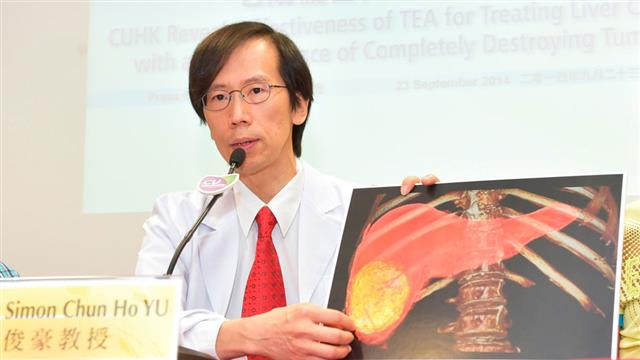The Faculty of Medicine has achieved a breakthrough in research on the treatment of primary liver cancer (hepatocellular carcinoma, HCC). Comparing with the conventional Transarterial chemoembolization (TACE), the research team proved that the new Transarterial Ethanol Ablation (TEA) is more effective in killing cancer cells with a 70% chance of completely destroying the tumor.
Hepatocellular carcinoma (HCC) is the fourth leading cause of cancer deaths worldwide and transarterial therapy is the most common treatment for primary liver cancer. TACE, a method that was introduced 30 years ago, is currently the most common form of transarterial treatment for primary liver cancer in Hong Kong and all over the world.
Prof. Simon Yu, professor of the Department of Imaging and Interventional Radiology and director of Vascular and Interventional Radiology Foundation Clinical Science Centre, has started his research on the use of TEA for treating HCC since 2001. According to his research, treatment related mortality was 0%. The median overall survival rate of patients after treatment was 26 months, much longer than the six months median overall survival in patients without treatment.
To compare the safety and effectiveness of TEA versus TACE for treating HCC, the research team led by Professor Yu conducted a randomized controlled trial from 2007 to 2012. The findings showed 0% treatment related mortality in both groups and indicated no difference in treatment safety between TEA and TACE. Most importantly, TEA was found to be more effective in completely eradicating tumor cells within the tumor, compared with TACE.
This pioneering research was presented with the Best Paper Award in the Congress of Interventional Oncology in 2013 and published in an international leading medical journal, Radiology, in 2014.
For details, please click here.


